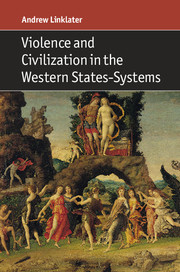Book contents
- Frontmatter
- Epigraph
- Contents
- Preface and Acknowledgements
- Introduction
- 1 The Hellenic City-States System
- 2 New Territorial Concentrations of Power in Antiquity
- 3 The International Relations of Latin Christendom
- 4 The Renaissance City-State System
- 5 The European States-System and the Idea of Civilization
- 6 Cruelty and Compassion in the Age of Empire
- 7 Enlightenment Thought and Global Civilization
- 8 Total Warfare and Decivilizing Processes
- 9 Modernity, Civilization and the Holocaust
- 10 Sovereignty, Citizenship and Humanity in the Global Civilizing Process
- 11 Process Sociology, Civilization and International Society
- Conclusion
- Bibliography
- Index
9 - Modernity, Civilization and the Holocaust
Published online by Cambridge University Press: 28 March 2017
- Frontmatter
- Epigraph
- Contents
- Preface and Acknowledgements
- Introduction
- 1 The Hellenic City-States System
- 2 New Territorial Concentrations of Power in Antiquity
- 3 The International Relations of Latin Christendom
- 4 The Renaissance City-State System
- 5 The European States-System and the Idea of Civilization
- 6 Cruelty and Compassion in the Age of Empire
- 7 Enlightenment Thought and Global Civilization
- 8 Total Warfare and Decivilizing Processes
- 9 Modernity, Civilization and the Holocaust
- 10 Sovereignty, Citizenship and Humanity in the Global Civilizing Process
- 11 Process Sociology, Civilization and International Society
- Conclusion
- Bibliography
- Index
Summary
Like scientific mass wars, the highly organized and scientifically planned extermination of whole groups of people in specially designed death camps and sealed-off ghettos by starvation, gassing or shooting does not seem entirely out of place in an age of technically advanced mass societies.
(Elias 2013: 225)The European civilizing process included, as discussed above, the internal pacification of modern societies, the parallel rise of constraints on aggressive impulses that operated through a deep-seated psychological revulsion against violence, and closer emotional bonds between members of the same society. Although largely unplanned, it was transformed into a conscious political project to reform society during the eighteenth and nineteenth centuries. Imperial doctrines most obviously captured the idea of a ‘civilizing mission’ in that period although many Enlightenment philosophers, in addition to condemning colonial cruelties, insisted that the process of civilization was far from complete within Europe itself. The ‘project of modernity’ captures the conception of unfinished business with respect to the establishment of social orders that promote human autonomy rather than slavish obedience to authority, that celebrate diversity and pluralism rather than bland uniformity and dogmatism, and that aim to embed ethical commitments to public reason in the rule of law (Devetak 1995). Inextricably connected with that ideal, for Kant at least, was the aspiration to extend the positive side of the civilizing process beyond territorial boundaries in the shape of close cooperation to advance towards perpetual peace. That endeavour was held to be realistic rather than utopian because of what Kant regarded as evidence of growing sympathy between specific social strata whose lives were increasingly intertwined by transnational commercial links and also because of the moral outrage that the ‘enlightened’ felt on learning about cruelties to colonized peoples.
The most flattering of European self-images held that further advances in civilization were more or less guaranteed although, as noted earlier, philosophers including Kant believed that progress could be reversed and that ‘nothing straight [could] be constructed from such warped wood as that which man is made of’ (Kant 1991 [1784a]: 46–7). From that perspective, there was nothing in the civilizing process itself that posed a major threat to continuing progress. The lurking threat was the ‘animal’ within human nature that civilization constantly battled against and might never completely subdue (Freud 1939: ch. 7).
- Type
- Chapter
- Information
- Violence and Civilization in the Western States-Systems , pp. 342 - 383Publisher: Cambridge University PressPrint publication year: 2017



